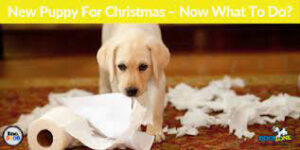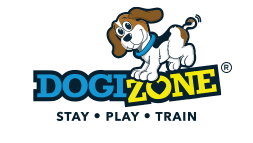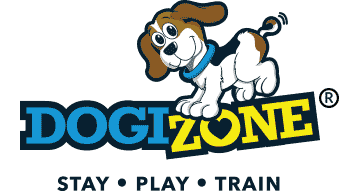New Puppy For Christmas – Now What To Do?
Many people carefully consider their options and decide that the holiday season is a perfect time for a new puppy. This is often the most memorable gift for a child or a loved one. When it is planned out in advance, it is a wonderful option to add a new member to the family. 
However, for many first-time dog owners, the excitement of a dog quickly turns into the reality of dealing with a four-legged family member. At Dogizone, we understand the stress, and we offered an easy to follow free guide on “Get Ready for the Christmas Present Puppy.” If you haven’t seen it yet, it’s not too late to get all the helpful information.
Our free download includes all the basics, including how to puppy-proof and prepare your home, what type of food to have on hand, and how to provide your puppy a great experience the first day in his or her new home.
The adjustment of the puppy to the home and the family to the puppy is critical. Puppies are going through a very dramatic change in their life. They are removed from their littermates and their Mom. As a pack animal, this is a very stressful situation.
To add to the challenges, they are in an unfamiliar setting. They do not have familiar scents and things around them, and they probably the center of attention for the family, something that is overwhelming to any dog. If puppies are frightened or traumatized at this age, they can have problems in bonding with the family, or they may have behavioral problems later.
The good news is this does not need to happen. To make your four-legged friend’s transition to your home a positive experience for all involved, here are a few critical considerations:
- Talk to the kids – set clear boundaries about interacting with the new puppy. This includes small children picking up the puppy, which can create a very real risk of injury to the puppy with an accidental drop or fall. Not only is this dangerous to the puppy, but it can also be devastating to kids if the dog is injured due to their actions.
- Make a safe place – a crate, a bed, or a designated puppy pen should be set up where the puppy will stay when Mom and Dad are not there to supervise the interaction. Kids need to respect this space that should be in a quiet area but still provide the puppy with the comfort of being in the same room as the family.
- Feeding and treats – designate times and places for feeding the little guy. Puppies younger than 4 months need feeding 4 times a day with quality puppy food. Those from 4 to 6 months should be fed three times a day, with some difference based on size.
- Potty training – puppies can be potty trained or housetrained at a young age. Training pads, frequent trips outside after eating, when waking up, and after playing helps to streamline the process.

